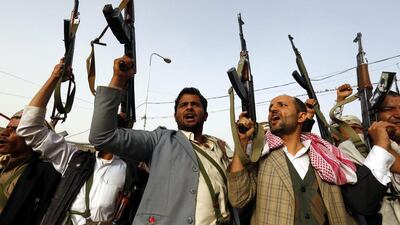The behaviour of Shia militias in Iraq, particularly after the recent regaining of Tikrit from ISIL, was a reminder of how Iran has repeatedly used such militias since the 1980s as an instrument to advance its interests in the Middle East.
The template was the formation of Hizbollah after Israel’s invasion of Lebanon in 1982. Since then, the party has been a cornerstone of Iran’s regional agenda, fighting as Tehran’s surrogate on battlefronts, training other militias and conducting intelligence operations and attacks against civilians on its behalf.
At the end of Lebanon’s civil war in 1990, both Syria and Iran saw an advantage in ensuring that Hizbollah would not be disarmed as other militias were.
The party was a convenient weapon to use against Israel’s occupation of southern Lebanon. More broadly, Hizbollah’s survival ensured that Iran retained leverage in Lebanon, particularly after Syrian forces withdrew in 2005.
Iran has seen several advantages in sponsoring sectarian militias, particularly Shia ones. The most obvious is that these can act on Tehran’s behalf, usually reporting in one way or another to Iranian officials or institutions. They also provide the Iranians with a way of circumventing established governments, even as their participation in, or collaboration with, these governments is frequently used to fudge the issue of state sovereignty.
The flip side of this is that the existence of militias tends to weaken governments, facilitating Iranian sway over a country. In Iraq and Lebanon, pro-Iran militias have been used to push Iranian preferences over those of state bodies, which can do little to oppose them. As a result governments are forced to find a modus vivendi with the militias, in the process agreeing, against their better judgment, to surrender a part of their authority.
And finally, militias offer deniability. For instance, the crimes committed by Shia militias in Iraq were rarely attributed to Iran or to the Shia-led Iraqi government, even if both benefited politically and bore a share of the responsibility for their excesses.
This was particularly true recently, when Tikrit was recaptured by the Iraqi government, led by Shia militias. The looting, killing and destruction of property in the town was attributed primarily to the combatants themselves. Not a word was said about Iran, especially the commander of the Quds Force of the Revolutionary Guards, Gen Qassem Suleimani, who directs Shia militia leaders and is said to have planned the Tikrit offensive.
Yet the fact is that Iran often benefits from militia abuse. Only someone naive would fail to see that Iran allowed the sectarian cleansing of predominately Sunni areas of Baghdad in past years, seeing it as a way of consolidating Shia control over the city.
In Lebanon, Hizbollah militants stand accused of participating in the assassination a decade ago of a former Lebanese prime minister, Rafik Hariri. While Syria is believed to have been behind the plot, Hizbollah’s role, if proven, means Iran signed off on the operation, regarding Mr Hariri as a threat to the pro-Syrian order in Lebanon, and by extension to Hizbollah.
In Syria, Iran has been a driving factor behind the establishment and training of militias, particularly the National Defence Force that emerged from the pro-Assad militias known as Popular Committees. Similarly, Iran ordered Hizbollah and Iraqi Shia militias to deploy in Syria, and has brought in Afghan Shia to bolster them.
The militias in Syria have taken on greater importance as the Syrian army has been degraded due to heavy losses in four years of bitter fighting. Bashar Al Assad’s regime is surviving thanks to two factors: Russian assistance to his armed forces and security apparatus; and Iranian involvement on the ground, either directly with Iranian combatants or through Shia militias.
Indeed, reports that Iraqi Shia militias had returned to Syria after having gone home to fight ISIL seem to indicate Iran’s alarm with Mr Al Assad’s deteriorating situation. Two weeks ago, in major reversals, the Syrian army and regime militias lost Idlib and Busra Al Sham to the rebels.
Iran’s strategy has been largely successful over the years, and has compensated for its very real limitations in many Arab countries. By establishing armed vanguards in places where the Shia are present, as a majority or even a minority, Iran has been able to exercise political power out of all proportion with what might otherwise have been expected.
The instability perpetuated by such groups has also been to Iran’s advantage. Tehran can only advance in mixed Arab societies that are divided.
Its backing of sectarian militias has allowed it to play on contradictions wherever it seeks power. That is why the rivalry between Iran and Sunni-majority Arab states will continue, at the forefront of which will be the militias sustained by Tehran.
Michael Young is opinion editor of The Daily Star newspaper in Beirut
On Twitter: @BeirutCalling


